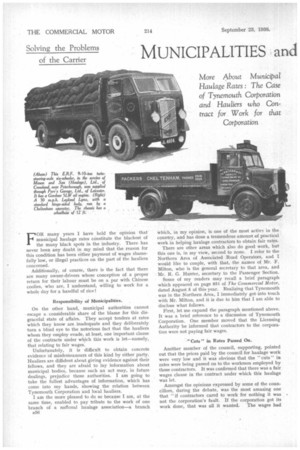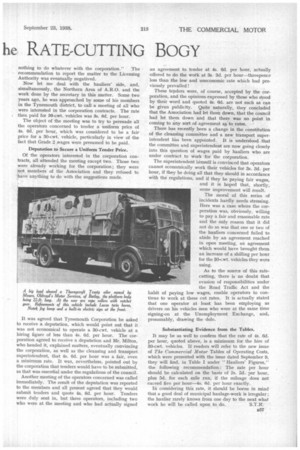MUNICIPALITIES and he RATE-CUTTING BOGY More About Municipal Haulage Rates
Page 90

Page 91

If you've noticed an error in this article please click here to report it so we can fix it.
: The Case of Tynemouth Corporation and Hauliers who Contract for Work for that
Corporation
FOR many years I have held the opinion that municipal haulage rates constitute the blackest of the many black spots in the industry. There has never been any doubt in my mind that the reason for this condition has been either payment of wages shamefully low, or illegal practices on the part of the hauliers concerned.
Additionally, of course, there is the fact that there are many owner-drivers whose conception of a proper return for their labour must be on a par with Chinese coolies, who are, I understand, willing to work for a whole day for a handful of rice!
Responsibility of Municipalities.
On the other hand, municipal authorities cannot escape a considerable share of the blame for this disgraceful state of affairs. They accept tenders at rates which they know are inadequate and they deliberately turn a blind eye to the notorious fact that the hauliers whom they employ evade, at least, one important clause of the contracts under which this work is let—namely, that relating to fair wages.
Unfortunately, it is difficult to obtain concrete evidence of misdemeanours of this kind by either party. Hauliers are diffident about giving evidence against their fellows, and they are afraid to lay information about municipal bodies, because such an act may, in future dealings, prejudice those authorities. I am going to take the fullest advantages of information, which has come into my hands, showing the relation between Tynemouth Corporation and local hauliers.
I am the more pleased to do so because I am, at the same time, enabled to pay tribute to the work of one branch of a national haulage association—a branch s56 which, in my opinion, is one of the most active in the country, and has done a tremendous amount of practical work in helping haulage contractors to obtain fair rates.
There are other areas which also do good work, but this one is, in my view, second to none. I refer to the Northern Area of Associated Road Operators, and I would like to couple, with that, the names of Mr. F. Milton, who is the general secretary to that area, and Mr. R. G. Hunter, secretary to the Passenger Section.
Some of my readers may recall a brief paragraph which appeared on page 851 of The Commercial Motor, dated August 5 of this year. Realizing that Tynemouth was in the Northern Area, I immediately got into touch with Mr. Milton, and it is due to him that I am able to disclose what follows.
First, let me expand the paragraph mentioned above. It was a brief reference to a discussion of Tynemouth Corporation. One member moved that the Licensing Authority be informed that contractors to the corporation were not paying fair wages.
"Cuts" in Rates Passed On.
Another member of the council, supporting, pointed out that the prices paid by the council for haulage work were very low and it was obvious that the "cuts" in rates were being passed on to the workmen employed by those contractors. It was confirmed that there was a fair wages clause in the contract under which this haulage was let.
Amongst the opinions expressed by some of the councillors, during the debate, was the most amazing one that "if contractors cared to work for nothing it was not the corporation's fault. If the corporation got its work done, that was all it wanted. The wages had
nothing to do whatever with the corporation." The recommendation to report the matter to the Licensing Authority was eventually negatived.
Now let me deal with the hauliers' side, and, simultaneously, the Northern Area of A.R.O. and the work done by the secretary in this matter. Some two years ago, he was approached by some of his members in the Tynemouth district, to call a meeting of all who were interested in the corporation contracts. The rate then paid for 30-cwt. vehicles was 3s. 6d. per hour.
The object of the meeting was to try to persuade all the operators concerned to tender a uniform price of 4s. 6d. per hour, which was considered to be a fair price for a 30-cwt.. vehicle, particularly in view of the fact that Grade 2 wages were presumed to be paid.
Deputation to Secure a Uniform Tender Price.
Of the operators interested in the corporation contracts, all attended the meeting except two. Those two were already working for the corporation ; they were not members of the Association and they refused to -have anything to do with the suggestions made.
It was agreed that Tynemouth Corporation be asked to receive a deputation, which would point out that it was not economical to operate a 30-cwt. vehicle at a hiring figure of less than 4s. 6d. per hour. The corporation agreed to receive a deputation and Mr. Milton, who headed it, explained matters, eventually convincing the corporation, as well as the cleansing and transport superintendent, that 4s. 6d. per hour was a fair, even a minimum rate. It was, nevertheless, pointed out by the corporation that tenders would have to be submitted, as that was essential under the regulations of the council.
Another meeting of the operators concerned was called immediately. The result of the deputation was reported to the members and all present agreed that they would submit tenders and quote 4s. 6d. per hour. Tenders were duly sent in, but three operators, including two who were at the meeting and who had actually signed
an agreement to tender at 4s. Gd. per hour, actually offered to do the work at 3s. 3d. per hour—threepence less than the low and uneconomic rate which had previously prevailed !
These tenders were, of course, accepted by the corporation, and the opinions expressed by those who stood by their word and quoted 4s. 6d. are not such as can be given publicity. Quite naturally, they concluded that the Association had let them down, that the council had let them down and that there was no point in coming to any sort of agreement as:to rates.
There has recently been a change in the constitution of the cleansing committee and a new transport superintendent has been appointed. It is understood that the committee and superintendent are now going closely into this question of wages paid by hauliers who are under contract to Work -for the corporation.
The superintendent himself is convinced that operators cannot economically work their vehicles for 3s. 3d. per hour, if they be doing all that they should in accordance with the regulations, and if they be paying fair wages, and it is hoped that, shortly, some improvement will result.
The moral of this series of incidents hardly needs stressing. Here was a case where the corporation was, obviously, willing to pay a fair and reasonable rate and the only reason that it did not do so was that one or two of the hauliers concerned failed to abide by an agreement reached in open meeting, an agreement which would have brought them an increase of a shilling per hour for the 30-cwt. vehicles they were using.
As to the source of this ratecutting, there is no doubt that evasion of responsibilities under the Road Traffic Act and the habit of paying low wages, enable operators to continue to work at these cut rates. It is actually stated that one operator at least has been employing as drivers on his vehicles men who were at the same time signing-on at the Unemployment Exchange, and, presumably, drawing the dole.
Substantiating Evidence from the Tables.
It may be as well to confirm that the rate of 4s. 6d.
per hour, quoted above, is a minimum for the hire of 30-cwt. vehicles. If readers will refer to the new issue of The Commercial Motor Tables of Operating Costs, which were presented with the issue dated September 9, they will find, in Table I under "Hauliers' Figures,"
the following recommendation: The rate per hour should be calculated on the basis of 2s. 5d. per hour, plus 5d. for each mile run, if the mileage does not exceed five per hour-4s. 6d. per hour exactly..
In considering this rate, it should be borne in mind that a good deal of municipal haulage-work is irregular ; the haulier rarely knows from one day to the next what work he will be called upon to do. S.T.R.












































































































































